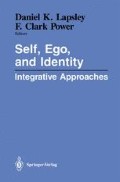Abstract
This chapter discusses the interrelationships among three major theoretical streams in developmental personality theory: psychosocial (ego psychoanalytic), cognitive/moral, and object relations. The starting point for looking at this proposed interrelationship is with the psychosocial concept of ego identity. The first section of this chapter concerns some theoretical and empirical justification for relating ego identity status to cognitive development, moral development, and the object relational concept of individuation. The second section of the chapter deals with these three approaches from the standpoint of their similar developmental goals, underlying processes, and child-rearing implications.
Access this chapter
Tax calculation will be finalised at checkout
Purchases are for personal use only
Preview
Unable to display preview. Download preview PDF.
References
Adams, G.R., Ryan, J.H., Hoffman, J.J., Dobson, W.R., & Nielsen, E.G. (1985). Ego identity status, conformity behavior, and personality in late adolescence. Journal of Personality and Social Psychology, 47, 1091–1104.
Ainsworth, M.D.S., Blehar, M., Waters, E., & Wall, E. (1978). Patterns of attachment. Hillsdale, NJ: Erlbaum.
Baumrind, D. (1967). Child care practices anteceding three patterns of preschool behavior. Genetic Psychology Monographs, 75, 43–88.
Bem, S.R. (1977). On the utility of alternative procedures for assessing psychological androgeny. Journal of Consulting and Clinical Psychology, 45, 196–205.
Bourne, E. (1978a). The state of research on ego identity: A review and appraisal: Part I. Journal of Youth and Adolescence, 7, 223–251.
Bourne, E. (1978b). The state of research on ego identity: A review and appraisal: Part II. Journal of Youth and Adolescence, 7, 371–392.
Bowlby, J. (1969). Attachment and loss: I. Attachment. New York: Basic Books.
Chandler, Michael. (in press). The Othello effect: An essay on the emergence and eclipse of skeptical doubt. Human Development.
Cooper, C.R., Grotevant, H.D., & Condin, S.M. (1983). Individuality and connectedness in the family as a context for adolescent identity formation and role-taking skill. In New Directions in & Child Development (pp. 43–59) H.D. Grotevant & C.R. Cooper (Eds.), Adolescent development in the family: San Francisco: Jossey-Bass.
Erikson, E.H. (1959). Identity and the life cycle. Psychological Issues, Monograph No. 1.
Gilligan, C. (1977). In a different voice: Women’s conception of the self and of morality. Harvard Educational Review, 47, 481–517.
Greenberg, J.R. & Mitchell, S.A. (1983). Object relations in psychoanalytic theory. Cambridge, MA: Harvard University Press.
Grotevant, H.D. & Cooper, C.R. (1985). Patterns of interaction in family relationships and the development of identity exploration in adolescence. Child Development, 56, 415–428.
Hansburg, H.G. (1980). Adolescent separation anxiety: A method for the study of adolescent separation problems (Vol. I). New York: Robert E. Krieger Co.
Hult, R.E. (1979). The relationship between ego identity status and moral reasoning in university women. The Journal of Psychology, 103, 203–207.
Kelly, G. (1955). The psychology of personal constructs (2 vols.). New York: Norton.
Kernberg, D.F. (1975). Borderline conditions and pathological narcissism. New York: Aronson.
Kohlberg, L. (1973). Continuities in childhood and adult moral development revisited. In P.B. Baltes & K.W. Schaie (Eds.), Life-span developmental psychology: Personality and socialization. New York: Academic Press.
Kroger, J. (1985). Separation-individuation and ego identity status in New Zealand university students. Journal of Youth and Adolescence, 14, 133–14
Leiper, R.N. (1981). The relationship of cognitive developmental structures to the formation of identity in young men. Unpublished doctoral dissertation, Simon Fraser University, Burnaby, British Columbia, Canada.
Levitz-Jones, E.M. & Orlofsky, J.L. (in press). Separation-individuation and intimacy capacity in college women. Journal of Personality and Social Psychology.
Mahler, M.S., Pine, F., & Bergman, A. (1975). The psychological birth of the human infant. New York: Basic Books.
Marcia, J.E. (1980). Identity in adolescence. In J. Adelson (Ed.), Handbook of adolescent psychology. New York: Wiley, pp. 159–187.
Marcia, J.E. (1983). Some directions for the investigation of ego identity development in early adolescence. Journal of Early Adolescence, 3, 215–223.
Marcia, J.E., Waterman, A.S., & Matteson, D.R. (in preparation). Studies in ego identity and intimacy: A handbook for psychosocial research.
Newberger, C.M. (1980). The cognitive structure of parenthood: Designing a descriptive measure. In New directions in child development (Vol. 7, pp. 45–67). San Francisco: Jossey-Bass.
Partol, S. (1980). The correlates of parental awareness. Unpublished doctoral dissertation, Graduate School of Education, Boston University.
Piaget, J., & Inhelder, B. (1958). The growth of logical thinking from childhood to adolescence. New York: Basic Books.
Podd, M.H. (1972). Ego identity status and morality: The relationship between two developmental constructs. Developmental Psychology, 6, 497–507.
Poppen, P.J. (1974). The development of sex differences in moral judgment for college males and females. Unpublished doctoral dissertaion, Cornell University.
Rowe, I., & Marcia, J.E. (1980). Ego identity status, formal operations, and moral development. Journal of Youth and Adolescence, 9, 87–99.
Schiedel, D.G., & Marcia, J.E. (1985). Ego identity, intimacy, sex role orientation, and gender. Developmental Psychology, 18, 149–160.
Sigel, I.E. (1984). Reflections on action theory and distancing theory. Human Development, 27, 188–193.
Sigel, I.E. McGillicuddy-Delisi, A.V., & Johnson, J.E. (1980). Parental distancing, beliefs, and children’s representational competence within the family context. ETS RR-80-21 (Educational Testing Service, Princeton, New Jersey).
Skoe, E. (1986). The development and partial validation of a care-based measure of moral development. Unpublished doctoral dissertation, Simon Fraser University, Burnaby, British Columbia, Canada.
Slugoski, B.R., Marcia, J.E., & Koopman, R.F. (1984). Cognitive and social interactional characteristics of ego identity statuses in college males. Journal of Personality and Social Psychology, 47, 646–661.
Waterman, A.S. (1982). Identity development from adolescence to adulthood: An extension of theory and a review of research. Developmental Psychology, 18, 342–358.
Editor information
Editors and Affiliations
Rights and permissions
Copyright information
© 1988 Springer-Verlag New York Inc.
About this chapter
Cite this chapter
Marcia, J.E. (1988). Common Processes Underlying Ego Identity, Cognitive/Moral Development, and Individuation. In: Lapsley, D.K., Power, F.C. (eds) Self, Ego, and Identity. Springer, New York, NY. https://doi.org/10.1007/978-1-4615-7834-5_10
Download citation
DOI: https://doi.org/10.1007/978-1-4615-7834-5_10
Publisher Name: Springer, New York, NY
Print ISBN: 978-1-4615-7836-9
Online ISBN: 978-1-4615-7834-5
eBook Packages: Springer Book Archive

